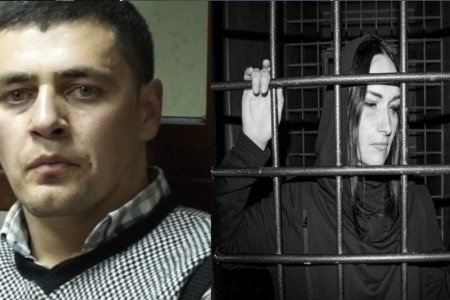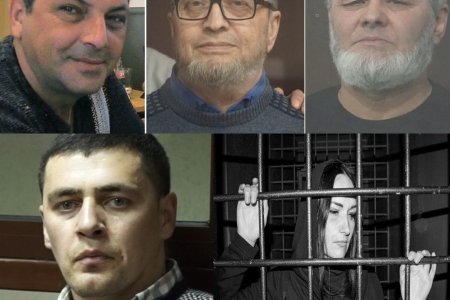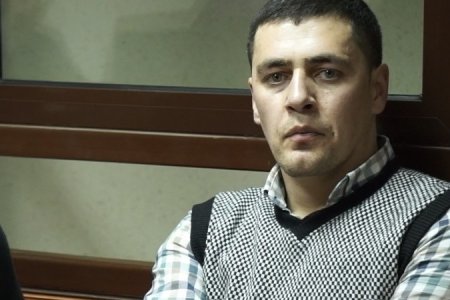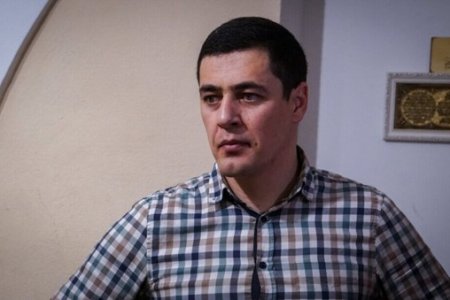
Two years after Russia’s FSB abducted Iryna Danilovych, the 44-year-old civic journalist and human rights defender remains in Russian captivity, deprived of urgently needed medical care. This has almost certainly caused significant loss of hearing and is causing other, potentially life-threatening conditions.
The cassation appeal before Russia’s Fourth General Jurisdiction Cassation Court was scheduled for 29 April 2024, but was adjourned to 2 May. One reason was the poor video link with the Russian prison colony where Danilovych is held prisoner, however the journalist had herself asked that it take place without her, saying that the lack of medical treatment left her unable to defend herself. There are no grounds for suspecting presiding judge Ivan Gromov of concern for Danilovych’s right to defend herself. According to Crimean Process, the adjournment was in order to get the paperwork right, with a written statement refusing to take part required from Danilovych. The court also added medical documents about Danilovich’s state of health to the case material. It is unclear, however, what documents are meant as Iryna was effectively left without any treatment for an excruciating ear inflammation and only received a medical examination after she declared a hunger strike. Bronislav Danilovich has since reported that his daughter is not receiving medication in the prison colony, not even that which the family obtained and sent. There are concerns that Danilovych, as well as losing hearing in her left ear, may have suffered a stroke, as a direct cause of the failure to react to her condition.
As a nurse, human rights defender and civic journalist in occupied Crimea, and as a Ukrainian, Iryna Danilovich was an inevitable target for FSB persecution. She was a regular contributor to independent media initiatives, like INzhir Media and Crimean Process, which wrote about Russian repression and political prisoners. Iryna was also the head of the Crimean branch of the Alliance of Doctors trade union and had taken part in attempts to obtain the promised, yet never provided, pandemic-linked supplementary payments for medical workers. She spoke publicly, without concealing her real name, about the lies that the occupation authorities were telling about the real number of covid patients.
Iryna was abducted by FSB officers in the early morning of 29 April 2022, as she was waiting for a bus to return home after a night shift. She was held incommunicado, in a basement, for a week before being formally detained on 7 May. During that time, her FSB captors subjected her to torture and threats, trying to force her into ‘confessing’ to totally fictitious contacts with foreign organizations and to so-called ‘state treason’. When they realized that she would not break, they claimed to have ‘found’ explosives in her glasses case (under Article 222.1 § 1 of Russia’s criminal code).
There were evident incongruities in the case, such as the fact that an entire volume of the material was devoted to her media interviews, although the charges were supposedly laid merely because of some explosives ‘found’ in a glasses case a week after she was taken prisoner by the FSB. No attempt was made to explain why she had allegedly been carrying explosives in a glasses case while working a night shift at the Malakhit Medical Centre in Koktebel.
The ‘trial’ took place under ‘judge’ Natalia Kulinskaya at the occupation ‘Feodosia municipal court’. Danilovich stated from the outset that she had been abducted, not ‘arrested’, with her account of events backed by CCTV footage of her seizure, as well as by the FSB’s refusal to reveal her whereabouts. The FSB even claimed that Danilovich had ‘voluntarily’ remained in their basement, with a bed, a shower, food, and other necessary items. They asserted that she could have left at any moment, but ‘decided to remain’ for want of a place to stay in Simferopol.
Kulinskaya allowed this nonsense, despite the FSB version directly contradicting their own claim that the alleged ‘explosives’ had been found immediately. Had she been in custody because of the explosives from the outset, she would not have been free to leave. If, however, she had not been able to leave, then why had there been no official charges until 7 May? On 28 December 2022, Kulinskaya handed down the entire 7-year sentence demanded by ‘prosecutors’ Dmitry Lyashchenko and Yulia Matvyeya, despite removing the part of the charges alleging that Danilovich had purchased the explosives since the FSB had not even tried to come up with some plausible explanation. A 50-thousand rouble fine was also imposed.
The sentence was upheld on 29 June 2023 by the occupation ‘Crimean high court’ with no attempt made here either to imitate a real review of the case. Presiding ‘judge’ Valeria Chernetska and two colleagues reduced the 7-year sentence by all of one month. No heed was paid to the above-mentioned irregularities nor the medical torment that Danilovich had been subjected to from October 2022. The ‘court’ ignored the fact, pointed out by the defence, that Danilovych had been unable to fully acquaint herself with the case material due to her state of health.
Please write to Iryna!
The letters tell her she is not forgotten, and are an important reminder to Moscow that their treatment of her is under scrutiny. Letters, unfortunately, need to be handwritten and in Russian. They should also be on ‘safe’ subjects, as they will be read by the censor. If that is a problem, use the sample letter below, maybe with a photo or picture.
The address below can be written in either Russian or in English transcription.
357910 Российская Федерация, ул. Почтовая д.78, Ставропольский край, г. Зеленокумск, ИК-7 Зеленокумск
Данилович, Ирине Брониславовне, г.р. 1979
[Or in English:
357910 Russian Federation, Pochtovaya St, No. 78, Stavropol Krai, Zelenokumsk, Women’s Prison Colony No. 7
Danilovich, Iryna Bronislavovna, b. 1979 ]
Sample letter
Привет,
Желаю Вам здоровья, мужества и терпения, надеюсь на скорое освобождение. Простите, что мало пишу – мне трудно писать по-русски, но мы все о Вас помним.
[Hi. I wish you good health, courage and patience and hope that you will soon be released. I’m sorry that this letter is short – it’s hard for me to write in Russian., but you are not forgotten. ]



